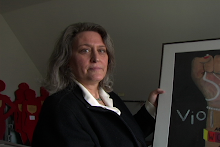Among the alternative approaches that are being developed by domestic violence advocates, probably the most talked about is “restorative justice,” which brings together batterers and survivors in an attempt to prevent further abuse.
Some view restorative justice as an alternative to jail sentences or batterer programs -- others see it as a supplement. It’s controversial. There’s a great deal of apprehension about restorative justice. Particularly when it’s presented as an alternative to the criminal justice-based response that’s been established as a result of the determined efforts of the battered women’s movement.
Yesterday we had an opportunity to observe one variant of restorative justice, an approach called “surrogate dialogue.” In these dialogues, a carefully prepared survivor is paired with a carefully prepared batterer -- both strangers to each other until the day of the dialogue. They go into a room together, along with the facilitators who worked with them in advance. They both tell their stories. They ask each other questions. The idea is to help the survivor continue to heal, feel empowered and listen, and to allow the batterer to achieve perspective on what he’s done.
Cathryn Curley of the Safe Haven Shelter in Duluth and Terry Fawcett of Duluth’s probation department organized this dialogue. It’s their fourth. They imported the idea from Hillsboro, Oregon, where the concept was developed by two domestic violence advocates at the Domestic Violence Surrogate program. The dialogues seek to “ generate understanding between the victim and offender as to each other's views and attitudes, as well as focus on the many consequences of domestic violence.”
In a phone interview this afternoon, Curley told us about the survivor’s reaction to the dialogue experience. She told Curley: “It was so healing for me, because he actually had empathy for me. He wasn’t my abuser, but he is an abuser.” Curley is also involved in another aspect of restorative justice -- sentencing circles. In these sessions, the offenders sit in a circle with community members for a dialogue that serves as an extension of any sentence that is meted out by the courts.
Camera person Alex Horner taped yesterday’s dialogue -- the session lasted for more than three hours. Stay tuned -- in coming months, we expect to post partial excerpts and transcripts of yesterday dialogue.
A Response from Anne Paulle
I think that perhaps the greatest irony in regard to domestic violence is that victim blaming revolves around excoriating DV victims for believing batterers while persons responding to DV -- lawyers, judges, health care professionals, clergy neighbors, Chris Brown enthusiasts-believe batterers all the time.
"Empathy" is a fluid, catalytic emotion: Receiving it can feel like fresh mountain water to somebody who is dying of thirst-- and leave one wanting more. Battered women's support and empowerment groups are more substantive with far fewer dangers and no specter of manipulation at all. Batterers routinely manipulate empathy: Any battered women's support group from Manila to the South Bronx, Shaker Heights OH to Birmingham UK will confirm batterer empathy manipulations.... and the support group's validation does not hold dangers for DV survivors.
I think that the most universally quoted data--I do not know exactly where it started--is that "studies show" that DV victims return to batterers six to seven times. Restorative justice initiatives support this reunification based on the emotional power of empathy.
But make no mistake, when battered women, validated through the empathy of restorative justice, return to the men who frighten,dominate and abuse them, we will blame them anyway.
Anne Paulle
Chair, "Power and Control" Board of Advisers
Tuesday, April 14, 2009
Thursday, April 2, 2009
Wrestling Against DV in CA
 An immigrants' rights group in the San Fernando Valley has found an imaginative strategy for getting out the word about domestic violence, particularly against women who are vulnerable because of their immigration status: wrestling against domestic violence, literally.
An immigrants' rights group in the San Fernando Valley has found an imaginative strategy for getting out the word about domestic violence, particularly against women who are vulnerable because of their immigration status: wrestling against domestic violence, literally.The group, Hermadad Mexicana, based in Panorama City, sponsored Mexican wrestling matches as a way of bringing attention in the community to the issue. According to the the San Fernando Valley Sun:
Mexican wrestling is part comedic show and athletic prowess, with flashy outfits and names for characters. The open air matches held Sunday featured wrestlers called "Minute Men," formed by INS and other Mexican-hating fighters, who threw tortillas into the air and tried to burn a Mexican hat.
Facing them was Bandido and other immigrant defenders. But the main fight featured the true immigrant defender, "Super Mojado" (Super Wetback), a character that appeared last year after an immigration raid at a Van Nuys factory that ended with the detention of more than 100 undocumented workers.
"Super Mojado", whose identity is a secret, has been practicing the sport for 15 years, works in construction and has a mission to fight for the rights of immigrants, including women abused by their husbands.
"I try to help everybody and today we're fighting on behalf of women who are abused," he said during an interview previous to his match.
The matches are part of a broader community education effort which includes a focus on the aspects of VAWA that are of particular help to immigrants, including U-Visas, which provide work permits and a possible path to permanent residency for undocumented victims of domestic violence.
Subscribe to:
Posts (Atom)







